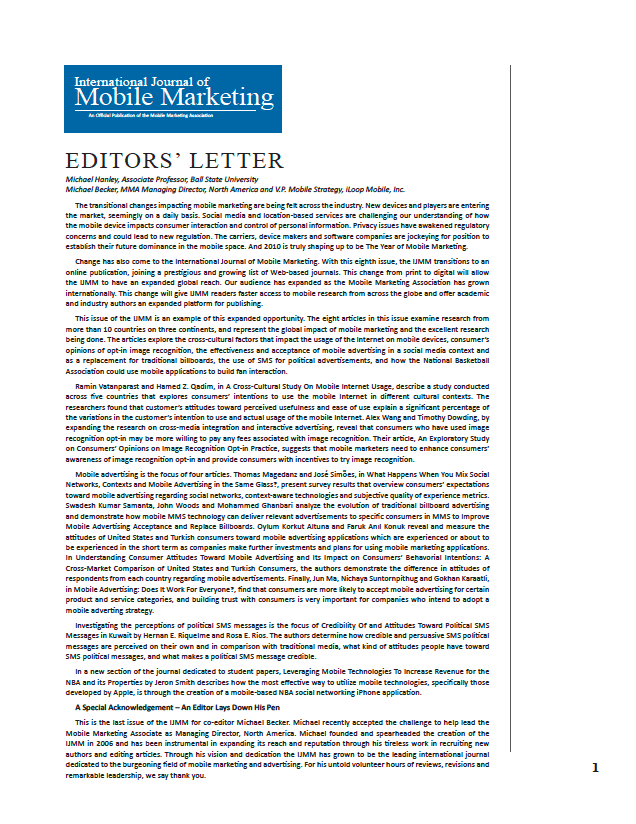The transitional changes impacting mobile marketing are being felt across the industry. New devices and players are entering the market, seemingly on a daily basis. Social media and location-based services are challenging our understanding of how the mobile device impacts consumer interaction and control of personal information. Privacy issues have awakened regulatory concerns and could lead to new regulation. The carriers, device makers and software companies are jockeying for position to establish their future dominance in the mobile space. And 2010 is truly shaping up to be The Year of Mobile Marketing.

Change has also come to the International Journal of Mobile Marketing. With this eighth issue, the IJMM transitions to an online publication, joining a prestigious and growing list of Web-based journals. This change from print to digital will allow the IJMM to have an expanded global reach. Our audience has expanded as the Mobile Marketing Association has grown internationally. This change will give IJMM readers faster access to mobile research from across the globe and offer academic and industry authors an expanded platform for publishing.
This issue of the IJMM is an example of this expanded opportunity. The eight articles in this issue examine research from more than 10 countries on three continents, and represent the global impact of mobile marketing and the excellent research being done. The articles explore the cross-cultural factors that impact the usage of the Internet on mobile devices, consumer’s opinions of opt-in image recognition, the effectiveness and acceptance of mobile advertising in a social media context and as a replacement for traditional billboards, the use of SMS for political advertisements, and how the National Basketball
Association could use mobile applications to build fan interaction Ramin Vatanparast and Hamed Z. Qadim, in A Cross-Cultural Study On Mobile Internet Usage, describe a study conducted across five countries that explores consumers’ intentions to use the mobile Internet in different cultural contexts. The researchers found that customer’s attitudes toward perceived usefulness and ease of use explain a significant percentage of the variations in the customer’s intention to use and actual usage of the mobile Internet. Alex Wang and Timothy Dowding, by expanding the research on cross-media integration and interactive advertising, reveal that consumers who have used image recognition opt-in may be more willing to pay any fees associated with image recognition. Their article, An Exploratory Study on Consumers’ Opinions on Image Recognition Opt-in Practice, suggests that mobile marketers need to enhance consumers’ awareness of image recognition opt-in and provide consumers with incentives to try image recognition. Mobile advertising is the focus of four articles. Thomas Magedanz and José Simões, in What Happens When You Mix Social Networks, Contexts and Mobile Advertising in the Same Glass?, present survey results that overview consumers expectations toward mobile advertising regarding social networks, context-aware technologies and subjective quality of experience metrics. Swadesh Kumar Samanta, John Woods and Mohammed Ghanbari analyze the evolution of traditional billboard advertising and demonstrate how mobile MMS technology can deliver relevant advertisements to specific consumers in MMS to Improve Mobile Advertising Acceptance and Replace Billboards. Oylum Korkut Altuna and Faruk Anıl Konuk reveal and measure the attitudes of United States and Turkish consumers toward mobile advertising applications which are experienced or about to be experienced in the short term as companies make further investments and plans for using mobile marketing applications. In Understanding Consumer Attitudes Toward Mobile Advertising and Its Impact on Consumers’ Behavorial Intentions: A Cross-Market Comparison of United States and Turkish Consumers, the authors demonstrate the difference in attitudes of respondents from each country regarding mobile advertisements. Finally, Jun Ma, Nichaya Suntornpithug and Gokhan Karaatli, in Mobile Advertising: Does It Work For Everyone?, find that consumers are more likely to accept mobile advertising for certain
product and service categories, and building trust with consumers is very important for companies who intend to adopt a mobile adverting strategy.
Investigating the perceptions of political SMS messages is the focus of Credibility Of and Attitudes Toward Political SMS Messages in Kuwait by Hernan E. Riquelme and Rosa E. Rios. The authors determine how credible and persuasive SMS political messages are perceived on their own and in comparison with traditional media, what kind of attitudes people have toward SMS political messages, and what makes a political SMS message credible.
In a new section of the journal dedicated to student papers, Leveraging Mobile Technologies To Increase Revenue for the NBA and its Properties by Jeron Smith describes how the most effective way to utilize mobile technologies, specifically those developed by Apple, is through the creation of a mobile-based NBA social networking iPhone application.
A Special Acknowledgement – An Editor Lays Down His Pen
This is the last issue of the IJMM for co-editor Michael Becker. Michael recently accepted the challenge to help lead the Mobile Marketing Associate as Managing Director, North America. Michael founded and spearheaded the creation of the IJMM in 2006 and has been instrumental in expanding its reach and reputation through his tireless work in recruiting new authors and editing articles. Through his vision and dedication the IJMM has grown to be the leading international journal dedicated to the burgeoning field of mobile marketing and advertising. For his untold volunteer hours of reviews, revisions and remarkable leadership, we say thank you.

No Comments.